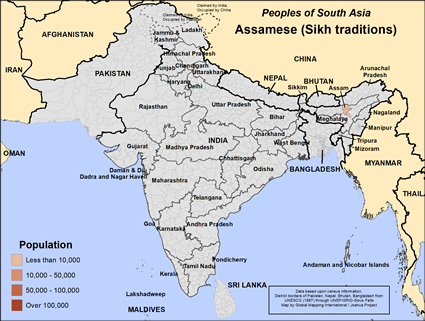Assamese (Sikh traditions) in India

Send Joshua Project a photo
of this people group. |

Map Source:
People Group data: Omid. Map geography: UNESCO / GMI. Map Design: Joshua Project
|
| People Name: | Assamese (Sikh traditions) |
| Country: | India |
| 10/40 Window: | Yes |
| Population: | 1,100 |
| World Population: | 1,100 |
| Primary Language: | Assamese |
| Primary Religion: | Other / Small |
| Christian Adherents: | 0.00 % |
| Evangelicals: | 0.00 % |
| Scripture: | Complete Bible |
| Ministry Resources: | Yes |
| Jesus Film: | Yes |
| Audio Recordings: | Yes |
| People Cluster: | South Asia Sikh - other |
| Affinity Bloc: | South Asian Peoples |
| Progress Level: |
|
Introduction / History
The Assamese live mainly in Assam, a state in northeastern India. Others live in other parts of India or nearby Bangladesh.
What Are Their Lives Like?
This is a cluster level profile for all Assamese people, be they Hindu, Muslim or Sikh.
Most live in villages, and only a small fraction live in towns or cities. More than half of the villagers are farmers. Rice is the principal crop, followed by tea and a fibrous Indian plant called jute. Mustard plants, potatoes, and fruits are also grown. Because the area has an abundance of rain, the farmers are able to produce rice year-round. About half of India's tea is grown on plantations that are located in Assam.
Other occupations that are held by villagers include small shops, fishing, and basket weaving. Those living in towns sometimes work as schoolteachers or office assistants. Their villages are typically surrounded by groves of bamboo, banana, and mango trees. Each farmer has a kett or rice plot, on the swampy plains near his home. This enables him to keep an eye on the rice fields year-round. Although only a few live in cities or towns, the cities play an important role in the lives of the villagers. Markets, bazaars, parks, and cinemas attract and entertain those living in rural areas. Hospitals and universities provide important services for them as well.
What Are Their Beliefs?
There are Assamese people who are Hindu and others are Muslim. Along with these is a small Sikh community.
Sikhism originated from a 15th century teacher named Guru Nanak Dev as a reform movement. He rejected the Hindu caste system, taught that all people were equal and that all have equal access to God. The Sikh God is formless, without gender and is to be found in everyone. One gets closer to God by living a good life and by practicing charity. Like Hindus, Sikhs believe in reincarnation and the law of karma; you reap what you sow in your previous life. Like Muslims, the Sikhs worship only one God.
One may recognize a Sikh man by his distinctive turban. All the 10 great Sikh gurus wore turbans. Sikh teaching mandates that a person not cut his or her hair. They worship their holy book, the Granth Sahib, which is a collection of hymns.
There are roughly the same number of Sikhs as there are Jews in the world, but Sikhs are most concentrated in Punjab, their homeland. However, you will find smaller numbers of Sikhs all over the world. Many of the best Indian restaurants in the West are owned and operated by Sikhs.
What Are Their Needs?
Sikh Assamese people need to put their trust and identity in the hands of the loving God of Creation who sent his son to make it possible for them to enjoy life to the full.
Prayer Points
Ask the Holy Spirit to complete the work begun in the hearts of the Assamese believers through adequate discipleship.
Pray for effectiveness of the JESUS Film among the Assamese.
Ask God to open hearts as they hear Christian radio in the Assamese language.
Pray that the Holy Spirit will create a hunger in the hearts of the Assamese to know the one true God.
Ask the Lord to raise up a strong network of local churches among the Assamese.